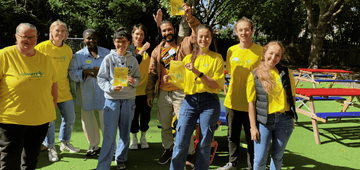James Toop is CEO of Bite Back 2030, a youth-led movement working to ensure every child has access to a good diet; at home, on the high street and at school. Previously, James served as CEO of Ambition Institute for eight years, developing a network of exceptional educators leading schools in disadvantaged communities. He was a teacher in the inaugural cohort of Teach First and management consultant at Monitor Group. He is currently Chair of Angel Oak Academy in Peckham and on the board of Ark Curriculum Partnerships.
On June 2nd Public Health England published its review into how different risk factors have affected Covid-19 risks and outcomes. An RSPH tweet summed it up: “existing inequalities have been replicated by COVID-19, and in some cases increased. New public health crisis, same story. Much work to be done.”
People living in the UK’s most deprived areas are twice as likely to die as a result of Covid-19 than their neighbours living in the least deprived areas. This is far greater than the normal gap in mortality rates, and suggests a shocking link between income and risk.
What is becoming clearer with every new case is that where you live and what you earn has a massive impact on your health and it is no coincidence that it has massive impact on your weight. 7.7% of patients critically ill in ICU were morbidly obese compared to 2.9% of the general population. What many of us were unaware of until now is that you are twice as likely to be obese if you live in one of our country’s most deprived areas.
Why are you more likely to be obese if you are living in a deprived area?
The RSPH’s Health on the High Street report has some of the answers. The unhealthiest high streets (Grimsby, Walsall and Blackpool in 2018) are those in the poorest areas with the highest obesity rates. At a micro level, this is replicated by analysis by the Guy’s & St Thomas’ Charity in the London Borough of Southwark where they find the same comparing the gap in obesity rates and income between the neighbouring areas of Camberwell Green and Dulwich Village.
The economic shock of Covid-19 is going to make these gaps a whole lot bigger. Many of these high streets are in those ‘red wall’ towns that the Prime Minister promised to level-up after the 2019 General Election. Only last week the Institute for Employment Studies predicted these towns would be the ones hardest hit by the job losses that are sure to come.
We have an opportunity now to use this public health crisis to write a different story. The Chancellor has taken unprecedented steps to support businesses and workers. But this vital fiscal support must be used to feed Britain better, not to rebuild high streets full of takeaways, fast food outlets and convenience stores with price promotions on snacks. This will only serve to feed health inequalities.
And we know the real risk of high streets laden with poor quality food bouncing back fastest in the poorest areas. Why? Because it was the story we saw before the pandemic - poor quality food is cheap and it tastes good. But to address the inequality that is so apparent in our hospital wards, we must rethink the high street. We can feed Britain better.
How can we change our ways and feed Britain Better?
We can start by building on the Chancellor’s existing policy changes:
- Business rates are at zero. Why not keep them that way for healthy businesses?
- The State is keeping many takeaways and fast food restaurants alive with loans and furlough schemes. Why not attach some conditions to this support that makes them keep healthier menus when they re-open?
- We could go further if we’re serious about levelling up. 65% of takeaway outlets are within 400m of a school. We can’t remove them but why can’t we change planning laws to stop new ones opening and licensing laws to make them healthier?
- Young people in these towns have nowhere to go after school so they are drawn to these fast food outlets and convenience stores as social spaces. Why can’t we direct the £500m of funding for new youth spaces to these areas to create alternative spaces to hang out?
We are at a moment in history. We have an opportunity to use this health crisis to write a different story. Or we can row back into the old normal at a faster rate creating economic and health inequalities that go deeper and last longer than ever before. With smart thinking, strong leadership and bold policies we can build back better. Communities across the country deserve change. We must seize this moment to feed Britain better.



